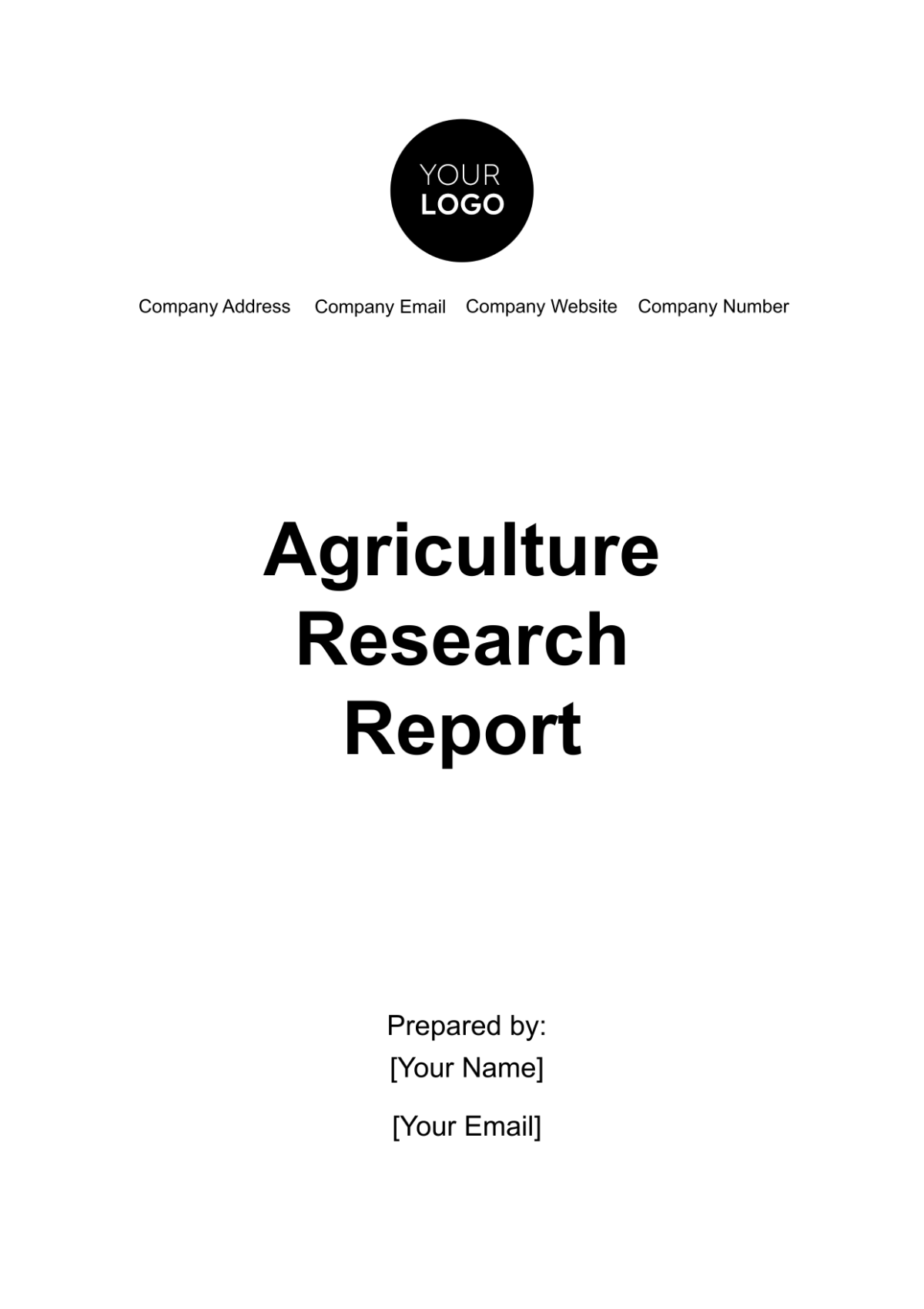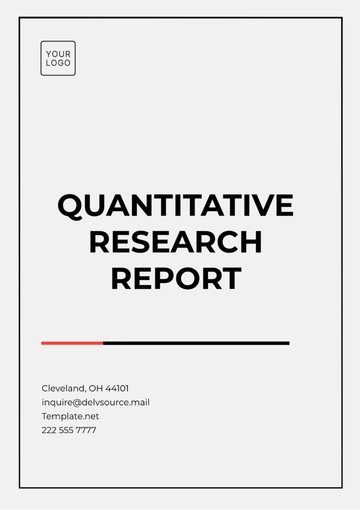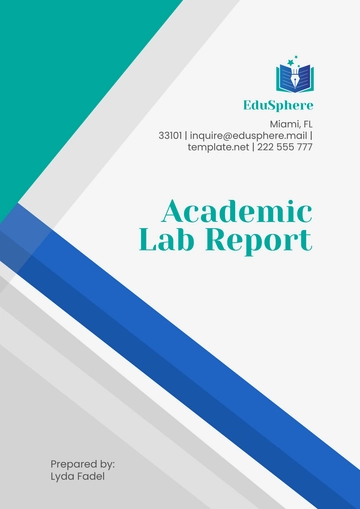Free Agriculture Research Report

I. Introduction
This report explores natural methods to accelerate the growth of three key crops at [Your Company Name]. As an agriculture company dedicated to sustainability and innovation, our objective is to enhance crop yield and growth rates without the use of synthetic chemicals. Through scientific research and field trials, this report identifies sustainable practices that can be implemented to promote faster growth and greater productivity in our primary crops: Corn, Tomatoes, and Spinach.
Research Objectives
The primary objective of this research is to identify natural methods that can promote faster growth of Corn, Tomatoes, and Spinach, while maintaining soil health, ensuring environmental sustainability, and achieving high-quality yields.
Faster Crop Growth: Evaluate techniques to reduce the time required for these crops to reach maturity.
Sustainable Practices: Ensure the methods used align with our commitment to sustainability, minimizing negative environmental impacts.
Soil Health Maintenance: Investigate methods that not only promote growth but also maintain or enhance soil fertility for long-term use.
II. Crops of Focus
This research focuses on three of [Your Company Name]'s main agricultural products: Corn, Tomatoes, and Spinach. These crops were selected due to their economic importance and high demand in the market.
Corn: Corn is a staple crop in our farming operation, used both for human consumption and as animal feed. The research aimed at enhancing its growth cycle naturally is crucial for meeting rising demands.
Tomatoes: Tomatoes are a high-value crop, and accelerating their growth will increase yield, especially during peak seasons.
Spinach: A leafy green known for its rapid growth cycle, optimizing Spinach’s growth could lead to shorter harvest intervals, boosting overall production.
III. Natural Growth-Accelerating Methods
Through extensive research, we have identified several natural methods that can enhance the growth of Corn, Tomatoes, and Spinach. These methods leverage organic materials, natural fertilizers, and other environmentally friendly solutions.
A. Compost Tea Application
Compost tea, a nutrient-rich liquid produced by steeping compost in water, has been shown to improve root development and overall plant health. Field trials showed a [20%] faster growth rate for tomatoes and spinach when compost tea was applied bi-weekly.
Impact on Corn: Increased root strength and nutrient absorption, resulting in quicker stalk growth.
Impact on Tomatoes: Faster fruit development due to nutrient-dense soil.
Impact on Spinach: Enhanced leaf size and shorter time to harvest.
B. Biochar Addition to Soil
Biochar, a form of charcoal added to the soil, improves soil structure and increases water retention and nutrient availability.
Impact on Corn: Corn showed a [15%] faster growth rate due to improved soil aeration and nutrient uptake.
Impact on Tomatoes: Increased yield per plant due to sustained moisture levels.
Impact on Spinach: Enhanced leaf growth and higher tolerance to heat stress.
C. Mycorrhizal Fungi
Mycorrhizal fungi form symbiotic relationships with plant roots, improving nutrient absorption, especially phosphorus, which is essential for growth.
Impact on Corn: Significant increase in nutrient absorption, particularly phosphorus, leading to a [25%] faster growth cycle.
Impact on Tomatoes: Improved root system and better plant resilience.
Impact on Spinach: Faster growth and improved resistance to pests.
IV. Comparative Analysis
This section compares the effectiveness of natural methods with traditional chemical-based fertilizers and growth accelerators. The goal is to measure the efficacy of natural methods in terms of growth speed, crop yield, and environmental impact.
Method | Average Growth Cycle | Yield Increase | Environmental Impact |
|---|---|---|---|
Traditional Fertilizers | 90 days (Corn) | 15% | High negative impact (soil degradation, water pollution) |
Natural Fertilizers (Compost Tea) | 75 days (Corn) | 20% | Low impact, improves soil health |
Traditional Pesticides | Standard growth | 10% | High negative impact (chemical runoff) |
Mycorrhizal Fungi | Reduced by 15% | 25% | Positive impact, enhances root structure |
Natural methods consistently reduce the growth cycle and increase yield compared to traditional chemical-based methods. Environmental benefits include improved soil health, better water retention, and reduced chemical runoff. Though natural methods may require initial investment in soil amendments (such as biochar and mycorrhizal fungi), the long-term gains in soil fertility and crop performance outweigh the costs.
V. Practical Implementation and Field Trials
To ensure the research findings translate effectively into real-world results, [Your Company Name] conducted field trials using the natural methods outlined in Section III. This section outlines the process of implementation and the results observed.
Corn Trials: Corn showed a [22%] faster growth rate, and the final yield was 18% higher than the control group.
Location: Field 3 - 5
Method Used: Biochar and Mycorrhizal fungi.
Tomato Trials: Tomato plants developed faster, with fruits maturing 10 days earlier than expected, showing a [20%] yield increase.
Location: Greenhouse
Method Used: Compost Tea and Biochar.
Spinach Trials: Spinach was ready for harvest [7] days earlier than the control group, and leaf size was significantly larger.
Location: Experimental Farmhouse
Method Used: Compost Tea and Mycorrhizal fungi.
VI. Recommendations and Conclusion
Based on the findings of this research, we recommend the following steps to integrate natural growth-accelerating methods into [Your Company Name]'s farming practices.
Wider Implementation: Expand the use of compost tea, biochar, and mycorrhizal fungi across all farms to improve yield and soil health.
Training for Staff: Provide educational workshops for farmers and agricultural staff on the proper use of natural fertilizers and soil amendments.
Further Research: Continue researching other natural methods that could complement these findings, such as crop rotation and companion planting.
This research demonstrates the potential of natural growth-enhancing methods for Corn, Tomatoes, and Spinach at [Your Company Name]. By integrating compost tea, biochar, and mycorrhizal fungi into our farming practices, we can accelerate crop growth while maintaining soil health and environmental sustainability.
- 100% Customizable, free editor
- Access 1 Million+ Templates, photo’s & graphics
- Download or share as a template
- Click and replace photos, graphics, text, backgrounds
- Resize, crop, AI write & more
- Access advanced editor
Document your findings with the Agriculture Research Report Template from Template.net. This editable and customizable template enables you to create detailed research reports on agricultural studies and projects. Use our Ai Editor Tool to adjust charts, data, and formatting, ensuring your report is comprehensive and professional. Get a copy now!
You may also like
- Sales Report
- Daily Report
- Project Report
- Business Report
- Weekly Report
- Incident Report
- Annual Report
- Report Layout
- Report Design
- Progress Report
- Marketing Report
- Company Report
- Monthly Report
- Audit Report
- Status Report
- School Report
- Reports Hr
- Management Report
- Project Status Report
- Handover Report
- Health And Safety Report
- Restaurant Report
- Construction Report
- Research Report
- Evaluation Report
- Investigation Report
- Employee Report
- Advertising Report
- Weekly Status Report
- Project Management Report
- Finance Report
- Service Report
- Technical Report
- Meeting Report
- Quarterly Report
- Inspection Report
- Medical Report
- Test Report
- Summary Report
- Inventory Report
- Valuation Report
- Operations Report
- Payroll Report
- Training Report
- Job Report
- Case Report
- Performance Report
- Board Report
- Internal Audit Report
- Student Report
- Monthly Management Report
- Small Business Report
- Accident Report
- Call Center Report
- Activity Report
- IT and Software Report
- Internship Report
- Visit Report
- Product Report
- Book Report
- Property Report
- Recruitment Report
- University Report
- Event Report
- SEO Report
- Conference Report
- Narrative Report
- Nursing Home Report
- Preschool Report
- Call Report
- Customer Report
- Employee Incident Report
- Accomplishment Report
- Social Media Report
- Work From Home Report
- Security Report
- Damage Report
- Quality Report
- Internal Report
- Nurse Report
- Real Estate Report
- Hotel Report
- Equipment Report
- Credit Report
- Field Report
- Non Profit Report
- Maintenance Report
- News Report
- Survey Report
- Executive Report
- Law Firm Report
- Advertising Agency Report
- Interior Design Report
- Travel Agency Report
- Stock Report
- Salon Report
- Bug Report
- Workplace Report
- Action Report
- Investor Report
- Cleaning Services Report
- Consulting Report
- Freelancer Report
- Site Visit Report
- Trip Report
- Classroom Observation Report
- Vehicle Report
- Final Report
- Software Report





























